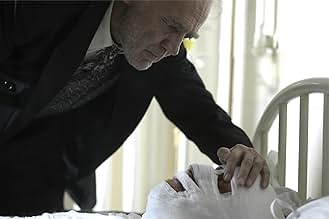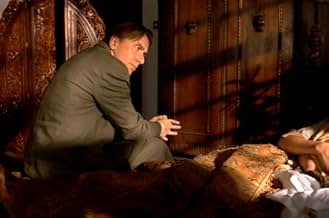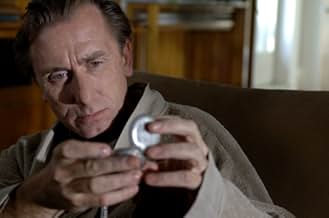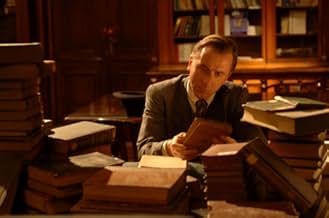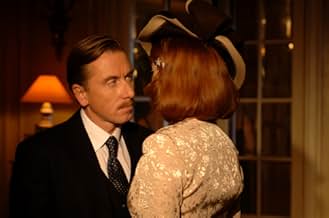VALUTAZIONE IMDb
6,1/10
14.609
LA TUA VALUTAZIONE
Una storia d'amore avvolta in un mistero. Ambientato nella seconda guerra mondiale in Europa, un professore viene trasformato da un evento catastrofico ed esplora i misteri della vita.Una storia d'amore avvolta in un mistero. Ambientato nella seconda guerra mondiale in Europa, un professore viene trasformato da un evento catastrofico ed esplora i misteri della vita.Una storia d'amore avvolta in un mistero. Ambientato nella seconda guerra mondiale in Europa, un professore viene trasformato da un evento catastrofico ed esplora i misteri della vita.
- Regia
- Sceneggiatura
- Star
- Premi
- 1 vittoria e 1 candidatura in totale
Dan Astileanu
- Professor
- (as Dan Astilean)
Recensioni in evidenza
This is definitely not everyone's cup of tea and has a pretty good chance of becoming a cult film. It explores major philosophic subjects from a dialectic angle, which might confuse pedestrians. In a nutshell: an elderly professor is challenged by his inability to complete his life's work. He is struck by lightning and gets the opportunity to observe life from a meta-human POV. He realizes that intellect, love , morals and reality in general are always ambiguous. IMO one must have some intellectual baggage, life experience and artistic curiosity in order to appreciate the profoundness of this film. Artistically, the film is very stylized and has a rather cold feel to it, something that might deter and alienate the viewer from actually empathizing with any of the characters. However, it's quite clever and stays with you after watching it. I would say that it felt to me a bit like a Darren Aronofsky film combined with Greenaway's Tulse Luper.
I saw mention of "Altered States" in the comments section, but I think a more apt parallel might be "The Fountain" by Aronofsky. In that film, an intellectual pursuit is pitted in juxtaposition to the more human pursuit of love. In "The Fountain" science is the pursuit and it is employed towards the end of salvaging a relationship, whereas with Coppola the pursuit is philosophy and its pursuit decidedly comes first symbolically and then physically at the unraveling of love.
So, yes this is a cerebral film. One that is driven often by dialog, including dialog conducted between a man and his double...and also in a language of the protagonists own creation. And yet the message here, while convoluted never came across as mere gibberish to me.
Instead, I hear the echoes of an old man, Coppola, who perhaps has seen his own life, and maybe lives of those around him, consumed by his own calling. And with the double, what film maker cannot feel the presence of a vying reality. Here we have mirrors, like Coppola's "Rumble Fish" shadows, that do not match the reality they should reflect.
I felt like the lightning strike could be seen as a character's epiphany that he is indeed a character in a story. More fifth dimension than fourth wall. But nonetheless fascinating. A superhero of sorts is born, but not exactly a Marvel.
Back to Aronofky's "Fountain" that film for me got bogged down in the trompe du CG-eye, whereas in "Youth Without Youth" whoever did the scenery scouting should be applauded. I felt more grounded in the real, yet often captivating, world filmed. (Was Malta, Malta or just another aspect of Romania?) Too bad I didn't feel the same way about casting, although others here have lauded Roth and Ganz, they were weaker links for me in their particular roles. Clearly Roth's role/s was/were demanding, for me he has the nervous energy of someone looking over his shoulder, more than a man lost in an inward gaze. A better maniac than a monomaniac. And Ganz, it felt like all of his lines were re-dubbed, to the point of a CGI-level distraction.
Nonetheless, a film with tricky mirrors provides some interesting reflection. Ultimately the film neither flaunts love as the salvation, nor rigorous study as providing an ultimate reward. For me the message was not even mystical, but simply that nature will claim every man.
Sure as the snow...
So, yes this is a cerebral film. One that is driven often by dialog, including dialog conducted between a man and his double...and also in a language of the protagonists own creation. And yet the message here, while convoluted never came across as mere gibberish to me.
Instead, I hear the echoes of an old man, Coppola, who perhaps has seen his own life, and maybe lives of those around him, consumed by his own calling. And with the double, what film maker cannot feel the presence of a vying reality. Here we have mirrors, like Coppola's "Rumble Fish" shadows, that do not match the reality they should reflect.
I felt like the lightning strike could be seen as a character's epiphany that he is indeed a character in a story. More fifth dimension than fourth wall. But nonetheless fascinating. A superhero of sorts is born, but not exactly a Marvel.
Back to Aronofky's "Fountain" that film for me got bogged down in the trompe du CG-eye, whereas in "Youth Without Youth" whoever did the scenery scouting should be applauded. I felt more grounded in the real, yet often captivating, world filmed. (Was Malta, Malta or just another aspect of Romania?) Too bad I didn't feel the same way about casting, although others here have lauded Roth and Ganz, they were weaker links for me in their particular roles. Clearly Roth's role/s was/were demanding, for me he has the nervous energy of someone looking over his shoulder, more than a man lost in an inward gaze. A better maniac than a monomaniac. And Ganz, it felt like all of his lines were re-dubbed, to the point of a CGI-level distraction.
Nonetheless, a film with tricky mirrors provides some interesting reflection. Ultimately the film neither flaunts love as the salvation, nor rigorous study as providing an ultimate reward. For me the message was not even mystical, but simply that nature will claim every man.
Sure as the snow...
First of all, i want to express my disgust for people who bash the movie because they didn't enjoy it, or didn't "get it". I accept other people's opinions, it is a free world (most of it anyway), but please stick to just stating your opinion, don't try to change how other people feel about it.
So, in my opinion, first and foremost, if you expect a movie that has drama or action that keeps you glued to your seat, this isn't for you. The plot of the movie has nothing to do with sci-fi, war time action or drama. It is a deeply philosophical movie that appeals to the reality matrix of people, trying to immerse you into some kind of a trance, where you begin to think like the author of the book, and the main character. If you are open minded enough, or a more than average philosophical person, this movie will be quite an experience for you. I know that for me, it was.
I liked it a lot mainly because of the dream/monologue scenes, because they somehow capture the essence of human thought. The doubt, the inner contradictions, the good and the bad sides of the same person. Things that most or all of us do, maybe not in a such out-of-body experience, but it does happen.
I don't want to give to much away, because half of the movie's effect on you has to do with the fact that it catches you off-guard.
So, in my opinion, first and foremost, if you expect a movie that has drama or action that keeps you glued to your seat, this isn't for you. The plot of the movie has nothing to do with sci-fi, war time action or drama. It is a deeply philosophical movie that appeals to the reality matrix of people, trying to immerse you into some kind of a trance, where you begin to think like the author of the book, and the main character. If you are open minded enough, or a more than average philosophical person, this movie will be quite an experience for you. I know that for me, it was.
I liked it a lot mainly because of the dream/monologue scenes, because they somehow capture the essence of human thought. The doubt, the inner contradictions, the good and the bad sides of the same person. Things that most or all of us do, maybe not in a such out-of-body experience, but it does happen.
I don't want to give to much away, because half of the movie's effect on you has to do with the fact that it catches you off-guard.
Youth Without Youth is a pretentious mess. Pretensiousness is underrated in films today, but that doesn't save it from not working. Coppolla seems to still remember the mechanics of film making, but he hasn't recovered the fervor yet. His new film is a beautiful, and sometimes interesting film with fine performances. The fact that it doesn't work is somewhat surprising, and mostly I think due to Coppolla's script and the mediocre editing. It is almost worth seeing just for the cinematography, and the performances by Roth and particularly Lara who are fantastic, but in the end it just isn't quite worth it. No matter how much I wanted to like it, I couldn't. It just didn't quite work.
A complex and challenging film, from one of the great American directors, and part of the continuing magical adventures of Tim Roth(The Legend Of 1900), this time around Roth is a linguistics professor trying to develop a theory of the origins of hum...(read more)an language and consciousness at his 70th birthday when he is struck by lightening that reverts him to his youth. Not only is he younger, but he discovers he can read whole books in minutes, see into dreams, and in the films most outlandish moments some limited telekinesis(but in all fairness it's his only way to stop an evil Nazi scientist who wants to jump start human evolution through electro shock). From there our hero meets a women who resembles one he used to know, who is similarly struck by lightening or near lightening which causes her to regress into previous lives. Naturally the two fall in love, and the odd couple are happy enough until her ancient language fits, get more frequent, and dive further and further into primitive languages, much to Roth's joy, though his love ages more and more with each regression.
Like I said Youth Without Youth is an ambitious mix of science fiction, world war 2 spy espionage, romance, meditation on death, aging, linguistics, the origins of consciousness, time, philosophy, the atomic bomb, multiple personalities, and reincarnation.
Watching Youth Without Youth is a bit like reading an overwrought but well written novel, where you can appreciate the skill of the speaker's use of language more than any profound statement being made. Not that Coppola's subjects are not profound, or treated, so, just that's it's done in such a way that at first view it's going to go over just about everyone's head. Author Mircea Eliade, is better known as a religious historian and academic, whose work is as rigorous as his fiction offerings. This is a well made and well performed film, but it's zeal gets ahead of itself on more than one occasion.
Like I said Youth Without Youth is an ambitious mix of science fiction, world war 2 spy espionage, romance, meditation on death, aging, linguistics, the origins of consciousness, time, philosophy, the atomic bomb, multiple personalities, and reincarnation.
Watching Youth Without Youth is a bit like reading an overwrought but well written novel, where you can appreciate the skill of the speaker's use of language more than any profound statement being made. Not that Coppola's subjects are not profound, or treated, so, just that's it's done in such a way that at first view it's going to go over just about everyone's head. Author Mircea Eliade, is better known as a religious historian and academic, whose work is as rigorous as his fiction offerings. This is a well made and well performed film, but it's zeal gets ahead of itself on more than one occasion.
Lo sapevi?
- QuizLanguages spoken in the film are English, French, Italian, Mandarin, German, Russian, Latin, Armenian, Sanskrit, Egyptian (not Arabic), Babylonian and a little Romanian. The ancient Sanskrit, Egyptian and Babylonian are authentic, researched in ancient texts and manuscripts by a team of expert linguists. The film also includes an artificial, "made-up" language, done with such integrity that it could provide the rudimentary basis of a new language.
- BlooperThe panoramic x ray shown when the teeth of the main character start to change is obviously from a 12 years old person as are clearly visible temporal molars (that are not present in adults) and their adult successors.
- Colonne sonoreMiddle Village
Written by Lev Zhurbin (as Lev 'Ljova' Zhurbin)
Performed by Lev Zhurbin (as Lev 'Ljova' Zhurbin) on viola and Balogh, Kálmán (cymbalom)
I più visti
Accedi per valutare e creare un elenco di titoli salvati per ottenere consigli personalizzati
Dettagli
- Data di uscita
- Paesi di origine
- Sito ufficiale
- Lingue
- Celebre anche come
- Youth Without Youth
- Luoghi delle riprese
- Aziende produttrici
- Vedi altri crediti dell’azienda su IMDbPro
Botteghino
- Budget
- 5.000.000 USD (previsto)
- Lordo Stati Uniti e Canada
- 244.397 USD
- Fine settimana di apertura Stati Uniti e Canada
- 28.550 USD
- 16 dic 2007
- Lordo in tutto il mondo
- 2.624.759 USD
- Tempo di esecuzione2 ore 4 minuti
- Colore
- Mix di suoni
- Proporzioni
- 2.35 : 1
Contribuisci a questa pagina
Suggerisci una modifica o aggiungi i contenuti mancanti

Divario superiore
By what name was Un'altra giovinezza (2007) officially released in Canada in French?
Rispondi






